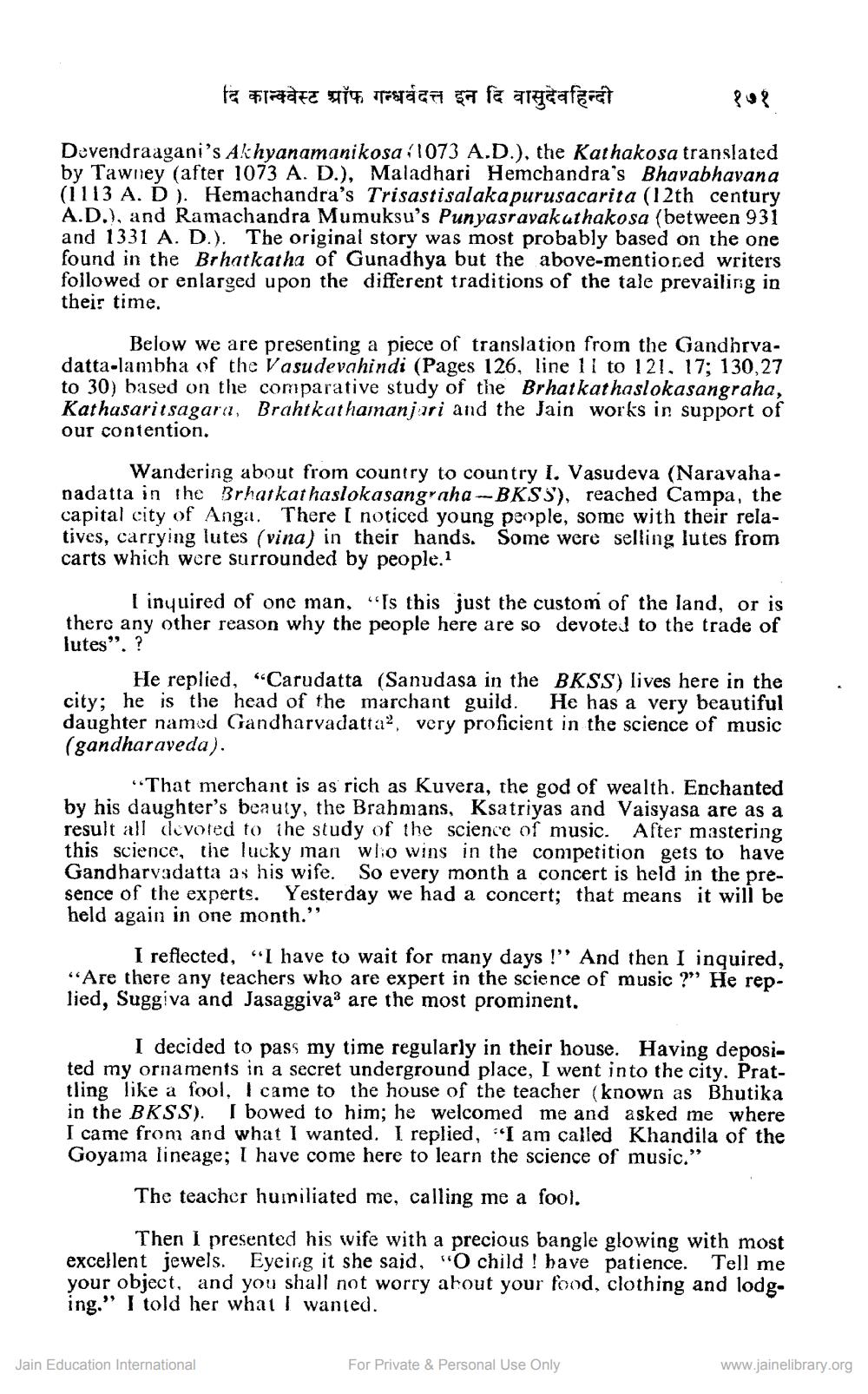________________
दि कान्क्वेस्ट प्रॉफ गन्धर्वदत्त इन दि वासुदेवहिन्दी
१७१
Devendraagani's Akhyanamanikosa í 1073 A.D.), the Kathakosa translated by Tawney (after 1073 A. D.), Maladhari Hemchandra's Bhavabhavana (1113 A. D). Hemachandra's Trisastisalaka purusacarita (12th century A.D.), and Ramachandra Mumuksu's Punyasravakathakosa (between 931 and 1331 A. D.). The original story was most probably based on the one found in the Brhatkatha of Gunadhya but the above-mentioned writers followed or enlarged upon the different traditions of the tale prevailing in their time.
Below we are presenting a piece of translation from the Gandhrva. datta-lambha of the Vasudevahindi (Pages 126, line 11 to 121, 17; 130,27 to 30) based on the comparative study of the Brhatkathaslokasangraha, Kathasaritsagara, Brahtkathamanjari and the Jain works in support of our contention.
Wandering about from country to country I. Vasudeva (Naravahanadatta in the Brhatkat haslokasangraha-BKSS), reached Campa, the capital city of Anga. There I noticed young people, some with their relatives, carrying lutes (vina) in their hands. Some were selling lutes from carts which were surrounded by people.1
I inyuired of one man, "Is this just the custom of the land, or is there any other reason why the people here are so devoted to the trade of lutes". ?
He replied, “Carudatta (Sanudasa in the BKSS) lives here in the city; he is the head of the marchant guild. He has a very beautiful daughter named Gandharvadatta, very proficient in the science of music (gandharaveda).
"That merchant is as rich as Kuvera, the god of wealth. Enchanted by his daughter's beauty, the Brahmans, Ksatriyas and Vaisyasa are as a result all devoted to the study of the science of music. After mastering this science, the lucky man who wins in the competition gets to have Gandharvadatta as his wife. So every month a concert is held in the presence of the experts. Yesterday we had a concert; that means it will be held again in one month."
I reflected. "I have to wait for many days !” And then I inquired, “Are there any teachers who are expert in the science of music ?" He replied, Suggiva and Jasaggiva: are the most prominent.
I decided to pass my time regularly in their house. Having deposited my ornaments in a secret underground place, I went into the city. Prattling like a fool, I came to the house of the teacher (known as Bhutika in the BKSS). I bowed to him; he welcomed me and asked me where I came from and what I wanted. I replied, "I am called Khandila of the Goyama lineage; I have come here to learn the science of music.”
The teacher humiliated me, calling me a fool.
Then I presented his wife with a precious bangle glowing with most excellent jewels. Eyeirig it she said, "O child ! have patience. Tell me your object, and you shall not worry about your food, clothing and lodg. ing." I told her what I wanted.
Jain Education International
For Private & Personal Use Only
www.jainelibrary.org




